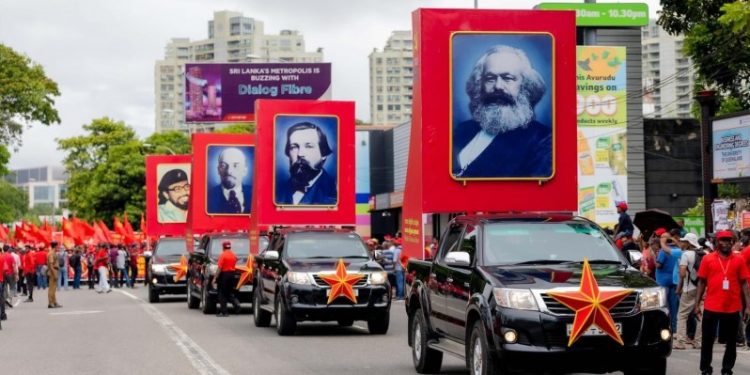By Miguel Lamas, a leader of the IWU-FI
The working people demand fundamental changes
In the presidential elections in Sri Lanka on 22 September, Anura Kumara Dissanayake, who defines himself as a Marxist, was elected as the new president. He represents the National People’s Power alliance, which includes his left-wing party, of which he has been president since 2014, the People’s Liberation Front (JVP). He won 42.3% of the vote against 32.8% for a centre-right candidate and 17% for the current president seeking re-election.
Thousands of people, many of them very young, workers, and labourers, came out to celebrate this electoral victory with red flags and portraits of Marx and Lenin. An international surprise. The massive columns with their flags and banners showed the expectations for fundamental changes in Sri Lanka.
The people’s rebellion of 2022
This electoral expression is directly connected with the insurrection of the working people two years ago in July 2022, when after three months of large mobilisations, hundreds of thousands of people took over the government house and the previous president had to flee the country.
This insurrection of 2022 was a popular reaction to the economic disaster. The international capitalist crisis made food and fuel more expensive, the foreign debt with China, Europe, and the USA became unpayable, and the capitalists, who earn from exports, took their dollars out of the country, the state was left without foreign currency. And they went for months without buying fuel and other imported goods, transport stopped running, electricity and gas were cut off, and basic medicines were no longer imported. Tens of thousands of workers were dismissed or suspended without pay.
The crisis and brutal exploitation of the workers continues
Sri Lanka is an island of 65,610 km2, located south of India, with 22 million inhabitants. It exports tea, coconut, coconut oil, and rice like other Asian countries. In the last 20 years, it has become a major exporter of textiles, associated with Japanese, Chinese, American, and European multinationals, with low-cost labour. Today it is called ‘the world’s bra factory’. Before the crisis and acute inflation and devaluation of the rupee (local currency), textile workers earned 62 dollars a month. Now it is much less, the textile workers earn 44 dollars minimum, but with a tremendous increase in the cost of living even measured in dollars. But they are also subjected to enslavement. They have to work between 14 and 16 hours a day, seven days a week. It is estimated to be the lowest wage in the Asia-Pacific region. The textile sector directly employs 400,000 workers and indirectly another two million, most of whom are mainly women from rural areas.
In July 2022, after the insurrection and flight of the previous president, Ranil Wickremesinghe was sworn in as the new president. He secured new loan agreements with the IMF, causing the state’s debt to become one of the world’s highest in relation to GDP (debt exceeds annual GDP). And with that a relative stability, but increasing taxes and with that the cost of living, and lowering real wages.
Bangladesh, like Sri Lanka, is also witnessing popular rebellion for change.
The new left-wing government
Anura Kumara Dissanayake, a member of parliament since 2000, has pledged to uphold the IMF agreement. He mentioned tax cuts affecting imports and renegotiating the IMF debt repayment.
The new president does not offer the deeply needed economic change for the working people to end poverty and exploitation.
The National People’s Power alliance could be defined as centre-left, made up of sectors of the reformist left, which does not propose to break with the IMF and capitalism. The interesting thing has been that the masses, who rebelled in 2022, channelled their unresolved grievances by voting for the left, for an alliance that claims to be Marxist.
In Sri Lanka, substantive change should begin with non-payment of the debt, nationalisation with workers’ control of the textile industry and protection of small farmers’ agricultural production. The new government will never approve, of course, this fundamental change, which the new president does not propose today, and will not be possible in the future.
In Sri Lanka, fundamental changes should begin with non-payment of the debt, nationalisation under workers’ control of the textile industry and protection of small farmers’ agricultural production. Of course, this fundamental change, which the new president does not propose today, and which the current parliament dominated by the business right will never approve, can only be achieved with the mass mobilisation of the working people, as it was the case two years ago.
The IWU-FI salutes and expresses unconditional solidarity with Sri Lanka’s workers. They fight for a fundamental change, for a real left government, for and of the working class and peasants. That government will open the road to socialism, as they showed in their celebratory marches, that puts an end to poverty and labour exploitation.













